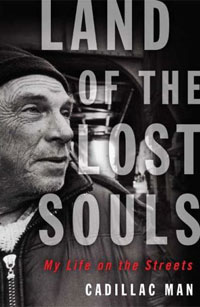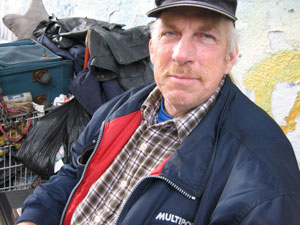Cadillac Man

Cadillac Man, as he was known on the streets, spent the better part of the past 15 years homeless in New York City. After losing a managerial position at a Pepsi plant, and then at a Hell’s Kitchen meat market, his second marriage dissolved. With nowhere else to go, he began living on the streets, making a living by collecting cans and bottles for recycling. He started a diary around this time, and his collected works, covering the highs and lows of his life in the mid-1990s, was published on March 17. Land of the Lost Souls (excerpt here) focuses on the relationships he developed while on the street in an effort to memorialize the lives of those often overlooked by general society.
TMN: Your first reading of the stories from this memoir took place in a homeless shelter. What was that like?
CM: Ah, it felt so good being amongst my brethen talking “street.” Reading my stories, looking into their eyes, connecting our souls into one being. My voice is theirs, to be spread to all those who will listen and not judge for we are people too. Only our circumstances are different; we bleed and cry just like you. Empathy!
TMN: Most of the stories in your book take place in the mid-1990s. Why do you tend to focus more on that time in your life?
CM: Yes, like a newborn child, this was my new beginning, a new identity. The old me was gone, the past meaningless, and the future ahead so filled with uncertainites, I wondered: Will I survive this ordeal? Become just another faceless unknown? Those early years taught me that even though life tossed a curve ball I was still able to connect with and not strikeout, meaning death. Also, it gave me purpose. The more I helped others, the more reason to live.
TMN: Throughout the book, the phrase “word is bond” keeps showing up. Did you adopt it before or after you became homeless, or is it just a ’90s thing?
CM: “Word?” “Word is bond!” Through traveling to many encampments, listening in on conversations, when someone finished what they had to say or was interrupted by another with “WORD?” meant, “Is that what you say is the truth, straight up?” “Word is bond!” meaning yes, no bullshit, the absolute truth said the replier. Some street people, depending where you are may use “word up?” but the reply is still the same. “Word is bond.” I used it at the Mens’ Shelter reading and they all knew I was speaking from the heart, no bullshit. Like everybody else, we don’t like being lied to.

TMN: What are you working on next?
CM: Still working on the latter years, 2000 to the present. So many stories yet to be told. A novel someday, and a “how to survive on the streets” guide book. Though I don’t wish it to occur on anybody, the book will contain useful hints, the dos and don’ts on the streets.
TMN: What’s something you’re not good at but wish you were?
CM: Wish I was better able to put my thoughts faster on paper and the computer. Adjusting to living inside again, fortunately I have a loving woman by my side who has the patience and understands where I came from. As I mentioned before, this is a new beginning and I want it to last.
TMN: How do you think being a police officer before becoming homeless made your experience different from others’?
CM: Several things they teach you in law enforcemet are observation and how to handle situations that most people don’t come across in their everyday lives. Because of this training, I was able to defuse and save my butt as well as others’. Some call it heroics. I say to that, it’s the right thing to do.
- use of a hand weapon (nightstick, gun)
- observation (intent, body language)
- the ability to take action with little or no hesitation rather than the normal shock/uninvolvement that occurs in society
TMN: Early in your book, you describe setting up a “peanut perimeter” alarm system. Did you come up with this trick or were you shown it by someone else?
CM: I saw someone—this one guy sleeping behind his wagon—use it. When I stepped there it was amazing how that sound carried through the night. I thought, “what a great idea.” I used it most of the time after that.
TMN: What’s one thing the average person could do to help the situation of homeless people?
CM: By donations to soup kitchens, clothing donations, anywhere where the finances go more directly to the clients. Too much goes toward administrative costs and other hidden agendas. Also, the public could be better educated about who we are and why we are here. They often believe they live far removed from our way of life, but in fact they do not. Losing everything could happen to anyone at any time.
TMN: What is your favorite object? (a particular book, a fire hydrant on your street, a keepsake from an old friend, etc.)
CM: The main answer would be my wagon. It lives under the 33rd street viaduct in Astoria. Photos are on Google. Other answers considered are:
- my teeth
- my hat
- my writer’s chair, an office chair kept next to my wagon.
TMN: What keeps you sane?
CM: My writing, the loving company of my companion, the upcoming baseball season, coffee and smokes, and the wonderful people of Astoria. Bless them.
